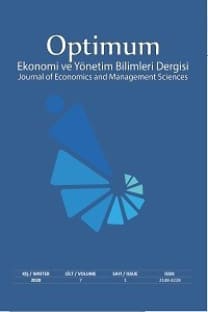Kayıtdışı Ekonomi: Türkiye Ekonomisi ve Türk Turizm Sektörü İçin Genel Bir Değerlendirme
Kayıt Dışı Ekonomi, Turizm Sektörü, Türkiye Ekonomisi
The Underground Economy: A General Assessment of Turkish Economy and Turkish Tourism Sector
Underground economy, Tourism Sector, Turkish Economy,
___
- Alakent, B. (2013), “Kayıt Dışı Turizm 15 Milyar $”, (21 Ağustos), Sabah Gazetesi.
- Derdiyok, T. (1993), “Türkiye’nin Kayıt Dışı Ekonomi Tahmini”, Türkiye İktisat Dergisi, Sayı 14.
- Emekli, G. (2005), “Avrupa Birliği’nde Turizm Politikaları ve Türkiye’de Kültürel Turizm”, Ege Coğrafya Dergisi, (14), ss. 99-107.
- Ersin, M., Yücel, C., Karabulut, E. ve Köfteoğlu, F. (1997), “AB Turizm Politikaları ve Türkiye”, TÜRSAB 25. Yıl Dizisi-1, Turpres Yayınları, İstanbul.
- Gelir İdaresi Başkanlığı (2009), “Kayıt Dışı Ekonomiyle Mücadele Stratejisi Eylem Planı (2008-2010)”, Yayın No: 87, Ankara.
- Gelir İdaresi Başkanlığı (2011), “Kayıt Dışı Ekonomiyle Mücadele Stratejisi Eylem Planı (2011-2013)”, (http://www.gib.gov.tr/).
- http://www.finances.gouv.fr
- http://www.tuik.gov.tr
- http://www.tuik.gov.tr
- Ilgın, Y. (1995), “Kayıt Dışı Ekonomi ve Türkiye’deki Boyutları”, DPT Uzmanlık Tezi, Ankara.
- Inland, R. (2000a), “Charter for Taxpayers”, http://www.inlandrevenue.gov.uk/
- Inland, R. (2000b), “Inland Revenue Plan 2000/01”, http://www.inlandrevenue.gov.uk/
- Inland, R. (2002), “Tax Law Rewrite: Introduction", http://www.inlandrevenue.gov.uk/
- IRS (2000), “Modernizing America's Tax Agency 2000”, IRS Publication No: 3349.
- Kızılot, Ş. (7 Temmuz 2009), “Güney Kore, Tayvan, Brezilya ve Çin”, Hürriyet Gazetesi, (http://hurarsiv.hurriyet.com.tr/goster/haber.aspx?id=12020748&yazarid=82).
- Kültür ve Turizm Bakanlığı (2012), “Türkiye’de Turizm Sektörüne Sağlanan Teşvik ve Destekler”, Ankara.
- OECD (2006), “Strenghtening Tax Audit Capabilities: General Principles and Approaches, Centre for Tax Policy and Administration”, http://www.oecd.org/tax/taxadministration/37589900.pdf
- OECD (2008), “Programs to Reduce the Administrative Burden of Tax Regulations in Selected Countries”, http://www.oecd.org/tax/taxadministration/39947998.pdf
- Rosotti, C. O. (1998), “A Modernized Internal Revenue Servise (Excerpt From the Statement Before the Senate Finance Committee, January 28, 1998)”, http://www.irs.gov/
- Schneider, F. (2011), “The Shadow Economy in Europe, 2011: Using Electronic Payment Systems to Combat The Shadow Economy”, Johannes Kepler University of Linz, Austria: A.T. Kearney Analysis.
- Schneider, F. and Enste, D. (2000), “Shadow Economies: Size, Causes and Consequences”, Journal of Economic Literature, No 38.
- Steward, C. (2000), “ Taxation Simplified 2000/2001”, Ghalford: Management Books 2000 Ltd.
- TÜRSAB (1998), “Dünyada ve Türkiye’de Seyahat Endüstrisi”, İstanbul.
- WTTC (2013), “Economic Impact of Travel & Tourism 2013 Annual Update: Summary”, UK, London.
- Zdanowicz, J. S. (2004), “Detecting Money Laundering and Terrorist Financing via Data Mining”, Communications of the ACM, Vol. 47, No. 5.
- Yayın Aralığı: Yılda 2 Sayı
- Başlangıç: 2014
- Yayıncı: -
Yönetsel Yargıda Vergi Davalarının Hukuki Niteliği: Tam Yargı –İptal Davası Tartışmaları
Tedarik Zinciri Yönetiminde Kurumsal Sosyal Sorumluluğun Yeri: Elektrikli Ev Aletleri Sektörü Örneği
Alparslan GÖRMÜŞ, Ezel DERER, Efe GÖKAKIN, Abdullah TİTİZ, Tarık ŞAHİN
Yönetim Kurulu Büyüklüğü ile Finansal Performans Arasındaki İlişkiye Yönelik Literatür Taraması
Yerel Yönetimler Reformunun Bir Parçası Olarak Köy Kanunu Tasarı Taslağı
Gelişen Futbol Ekonomisinde Taraftarların Kulüp Değerlerine Olan Bakış Açıları: Bucaspor Örneği
Çağatay ORÇUN, Mehmet Can DEMİRTAŞ
İşletmelerde Finansal Performansın Artmasında Halkla İlişkilerin Rolü ve Halkla İlişkiler Algısı
Kayıtdışı Ekonomi: Türkiye Ekonomisi ve Türk Turizm Sektörü İçin Genel Bir Değerlendirme
Sosyal Medya Ekonomisinin Mikro İktisadi Temelleri Üzerine Bir İnceleme
